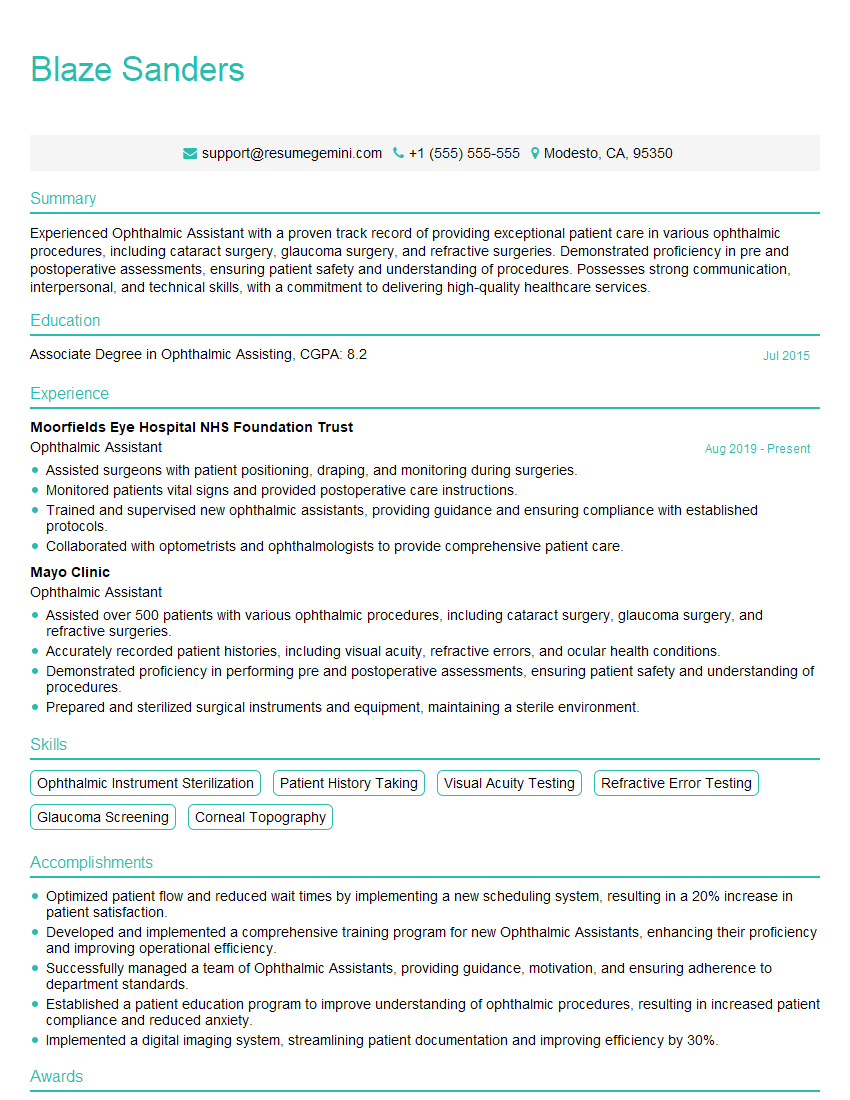Are you a seasoned Ophthalmic Assistant seeking a new career path? Discover our professionally built Ophthalmic Assistant Resume Template. This time-saving tool provides a solid foundation for your job search. Simply click “Edit Resume” to customize it with your unique experiences and achievements. Customize fonts and colors to match your personal style and increase your chances of landing your dream job. Explore more Resume Templates for additional options.

Blaze Sanders
Ophthalmic Assistant
Summary
Experienced Ophthalmic Assistant with a proven track record of providing exceptional patient care in various ophthalmic procedures, including cataract surgery, glaucoma surgery, and refractive surgeries. Demonstrated proficiency in pre and postoperative assessments, ensuring patient safety and understanding of procedures. Possesses strong communication, interpersonal, and technical skills, with a commitment to delivering high-quality healthcare services.
Education
Associate Degree in Ophthalmic Assisting
July 2015
Skills
- Ophthalmic Instrument Sterilization
- Patient History Taking
- Visual Acuity Testing
- Refractive Error Testing
- Glaucoma Screening
- Corneal Topography
Work Experience
Ophthalmic Assistant
- Assisted surgeons with patient positioning, draping, and monitoring during surgeries.
- Monitored patients vital signs and provided postoperative care instructions.
- Trained and supervised new ophthalmic assistants, providing guidance and ensuring compliance with established protocols.
- Collaborated with optometrists and ophthalmologists to provide comprehensive patient care.
Ophthalmic Assistant
- Assisted over 500 patients with various ophthalmic procedures, including cataract surgery, glaucoma surgery, and refractive surgeries.
- Accurately recorded patient histories, including visual acuity, refractive errors, and ocular health conditions.
- Demonstrated proficiency in performing pre and postoperative assessments, ensuring patient safety and understanding of procedures.
- Prepared and sterilized surgical instruments and equipment, maintaining a sterile environment.
Accomplishments
- Optimized patient flow and reduced wait times by implementing a new scheduling system, resulting in a 20% increase in patient satisfaction.
- Developed and implemented a comprehensive training program for new Ophthalmic Assistants, enhancing their proficiency and improving operational efficiency.
- Successfully managed a team of Ophthalmic Assistants, providing guidance, motivation, and ensuring adherence to department standards.
- Established a patient education program to improve understanding of ophthalmic procedures, resulting in increased patient compliance and reduced anxiety.
- Implemented a digital imaging system, streamlining patient documentation and improving efficiency by 30%.
Awards
- Received the Ophthalmic Assistant of the Year Award for outstanding dedication and contributions to the field.
- Recognized with the Patient Advocacy Award for consistently going above and beyond to ensure patient comfort and wellbeing.
- Awarded the Excellence in Surgical Assisting for exceptional assistance during complex ophthalmic surgeries, contributing to successful patient outcomes.
- Honored with the Ophthalmic Society Recognition for contributions to research and advancement of the field.
Certificates
- Certified Ophthalmic Assistant (COA)
- Certified Ophthalmic Technician (COT)
- Certified Vision Assistant (CVA)
- American Medical Technologists (AMT)
Career Expert Tips:
- Select the ideal resume template to showcase your professional experience effectively.
- Master the art of resume writing to highlight your unique qualifications and achievements.
- Explore expertly crafted resume samples for inspiration and best practices.
- Build your best resume for free this new year with ResumeGemini. Enjoy exclusive discounts on ATS optimized resume templates.
How To Write Resume For Ophthalmic Assistant
Highlight your patient care experience:
Showcase your expertise in providing compassionate and efficient care to patients before, during, and after ophthalmic procedures.Quantify your accomplishments:
Use numbers and specific examples to demonstrate the impact of your work, such as the number of patients assisted, successful surgeries supported, or improvements in patient outcomes.Emphasize your technical skills:
Describe your proficiency in using ophthalmic instruments, performing visual acuity tests, and assisting with surgical procedures.Demonstrate your commitment to professional development:
Mention any certifications, training programs, or conferences you have attended to enhance your knowledge and skills.
Essential Experience Highlights for a Strong Ophthalmic Assistant Resume
- Assisting surgeons with patient positioning, draping, and monitoring during surgeries.
- Preparing and sterilizing surgical instruments and equipment, ensuring a sterile environment.
- Accurately recording patient histories, including visual acuity, refractive errors, and ocular health conditions.
- Demonstrating proficiency in performing pre and postoperative assessments, ensuring patient safety and understanding of procedures.
- Monitoring patients vital signs and providing postoperative care instructions.
- Training and supervising new ophthalmic assistants, providing guidance, and ensuring compliance with established protocols.
- Collaborating with optometrists and ophthalmologists to provide comprehensive patient care.
Frequently Asked Questions (FAQ’s) For Ophthalmic Assistant
What is the role of an Ophthalmic Assistant?
An Ophthalmic Assistant is a healthcare professional who provides support to ophthalmologists and optometrists in the diagnosis and treatment of eye conditions. They assist with surgical procedures, perform pre and postoperative assessments, prepare and sterilize surgical instruments, and provide patient care.
What are the qualifications to become an Ophthalmic Assistant?
Typically, an Associate Degree in Ophthalmic Assisting or a related field is required. Additionally, certification from the Joint Commission on Allied Health Personnel in Ophthalmology (JCAHPO) is highly recommended.
What are the career prospects for Ophthalmic Assistants?
Ophthalmic Assistants are in high demand due to the increasing prevalence of eye conditions and the aging population. They can work in various settings, including hospitals, clinics, and private practices, and may advance to roles such as Surgical Assistant or Ophthalmic Technician.
What are the key skills required for Ophthalmic Assistants?
Ophthalmic Assistants should possess strong communication and interpersonal skills, as well as technical proficiency in ophthalmic equipment and procedures. They should be detail-oriented, organized, and have a compassionate nature.
What is the work environment like for Ophthalmic Assistants?
Ophthalmic Assistants typically work in a fast-paced and demanding environment, often assisting with multiple surgeries or procedures simultaneously. They must be able to work independently and as part of a team, and maintain a sterile and organized work area.
What are the earning prospects for Ophthalmic Assistants?
According to the U.S. Bureau of Labor Statistics, the median annual salary for Ophthalmic Assistants was $56,880 in May 2021. The top 10% earned more than $85,380, while the bottom 10% earned less than $34,830.